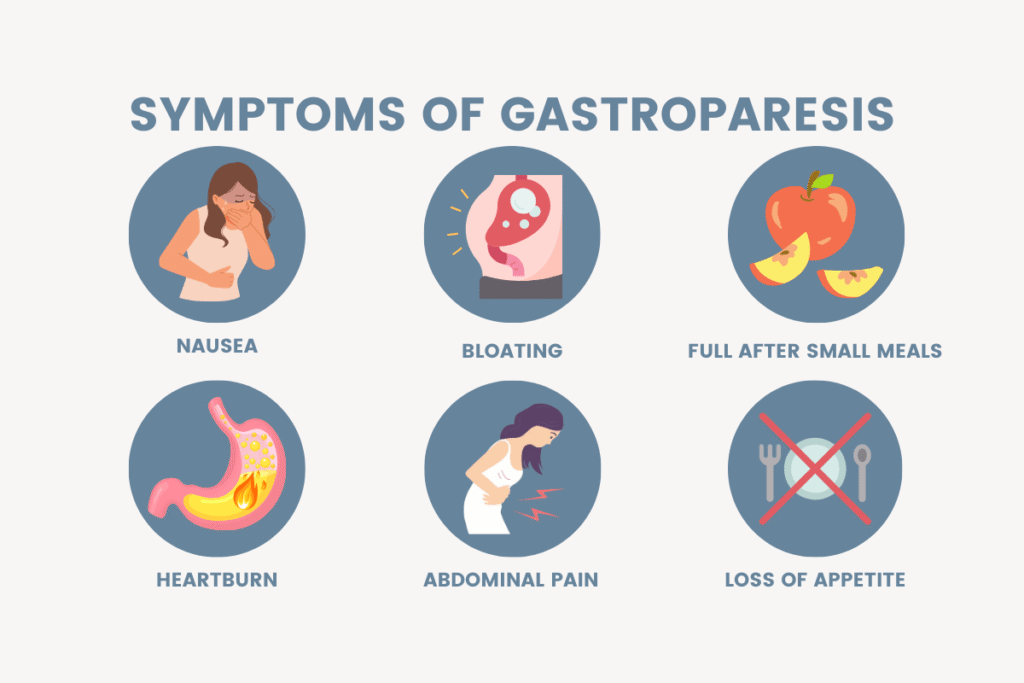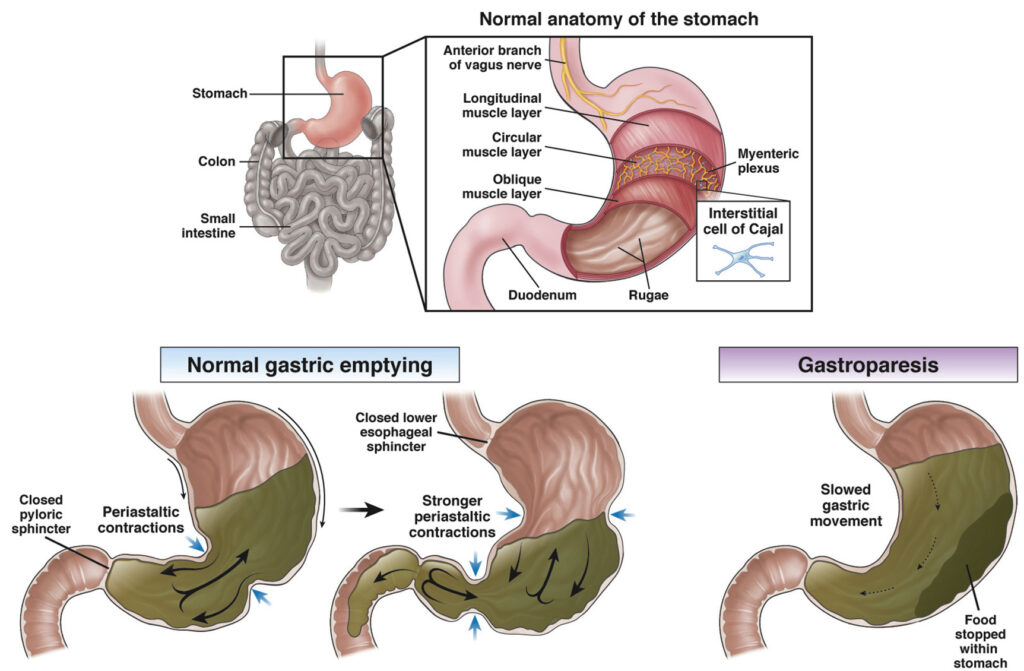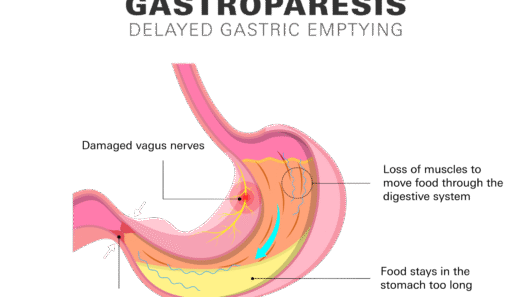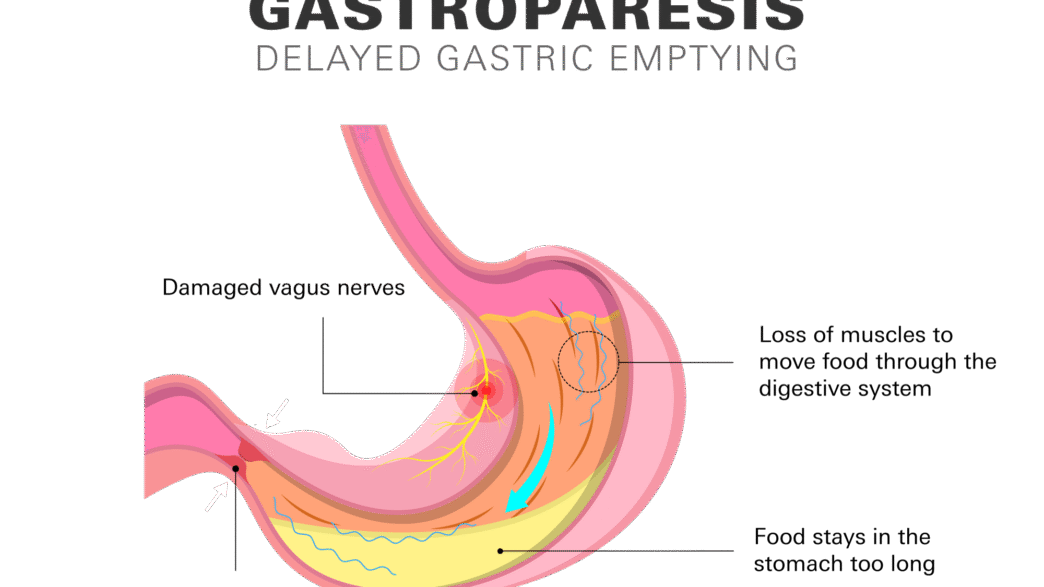A condition known as gastroparesis, or delayed gastric emptying, causes food to pass from the stomach to the small intestine more slowly or not at all, even when there is no obstruction in the stomach or intestines.
Gastroparesis – What is it?
The disorder known as gastroparesis, or stomach paralysis, affects the muscles and nerves in your stomach. It disrupts the process by which food passes from your stomach into your small intestine, known as peristalsis.
Your stomach cannot properly process food or empty itself when its muscles and nerves aren’t working properly. This delays the entire digestion process.
In addition to experiencing painful symptoms during digestion, people with gastroparesis may also have longer-lasting negative effects. They may struggle to control their blood sugar levels, have a poor appetite, and struggle to achieve their nutritional demands.
When food does eventually exit the stomach, some may remain behind because it may not pass all the way. A bezoar is a solid, hardened mass that may form from this.
Types
Based on the cause, medical professionals frequently divide gastroparesis into subtypes.
- For instance, diabetes-related gastroparesis could be the term used to describe gastroparesis that develops as a consequence of diabetes.
- Post-surgical gastroparesis is another name for gastroparesis that develops as a consequence of surgery.
- Idiopathic gastroparesis is the term used to describe gastroparesis that happens for no apparent reason.
Which kind of gastroparesis is most common?
The majority of gastroparesis cases (between 25% and 50%) are classified as idiopathic, meaning that medical professionals are unable to identify the reason.
However, cases that fit into this category could have a number of causes, including established causes that were just impossible to identify. The most frequent cause of gastroparesis is diabetes. Approximately one-third of patients receive a diagnosis related to diabetes.
Symptoms
Typical signs and symptoms include:
- Indigestion.
- Stomach bloat.
- Experiencing prolonged and/or rapid feelings of fullness.
- Ache in the upper abdomen.
- Vomiting and nausea.
- Spitting up whole bits of undigested food is known as regurgitation.
- Appetite loss.
- Heartburn and acid reflux.
- Variations in blood sugar.
- Constipation.

Main causes
Sometimes the cause of gastroparesis is unclear. However, it can occasionally be brought on by injury to a nerve that regulates the muscles in the stomach. The vagus nerve is the name given to this nerve.
The vagus nerve aids in controlling the digestive tract’s activity. This involves instructing the stomach’s muscles to contract in order to force food into the small intestine. The stomach muscles cannot receive signals from a damaged vagus nerve. Food may remain in the stomach longer as a result of this.
The vagus nerve and its branches can be harmed by diseases like diabetes or stomach or small intestine surgery.
Typical risk factors
The following variables may increase the risk of gastroparesis:
- Diabetes.
- Surgery on the stomach or the esophageal tube, which runs from the throat to the stomach.
- Specific tumors and cancer therapies, such stomach or chest radiation therapy.
- Some medications, like opioid painkillers, slow the rate at which the stomach empties.
- Scleroderma is a disorder that makes the skin tight and rigid.
- Disorders of the nervous system, including multiple sclerosis, Parkinson’s disease, and migraines.
- Hypothyroidism is another name for an underactive thyroid.
- Compared to those assigned male at birth, those assigned female at birth have a higher risk of developing gastroparesis.

Available treatments
Although medical professionals are unable to immediately repair the damage that causes gastroparesis, they can treat it by encouraging your stomach’s muscles to contract and help it empty.
Surgery is saved for patients who cannot take or do not respond to drugs, which are the first line of treatment. No single treatment is effective for everyone, and all of them have the potential to cause negative side effects.
The first line of treatment for gastroparesis is prokinetics, which are drugs that increase gastrointestinal motility.
Your illness may require you to modify your diet; for instance, you may need to consume less fat and fiber to facilitate digestion. In order to replenish lost nutrients, you may also require more specialized nutritional therapy.
The last option for treating gastroparesis is surgery. Surgery to alter your stomach to facilitate food passage may be necessary if all other therapies are unsuccessful.
Conclusion
Paralysis of the stomach is known as gastroparesis. It is a functional condition that affects the muscles and nerves in your stomach. It weakens and slows down the contractions of the muscles in your stomach, which are necessary for breaking down food and moving it to your intestines. This causes food to remain in your stomach for an extended period of time.

















